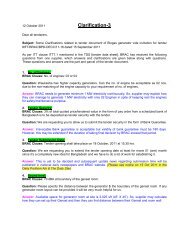Draft for comments only Reviewing existing NGO services for the ...
Draft for comments only Reviewing existing NGO services for the ...
Draft for comments only Reviewing existing NGO services for the ...
Create successful ePaper yourself
Turn your PDF publications into a flip-book with our unique Google optimized e-Paper software.
programmes. International donor agencies fund most of <strong>the</strong>se relief activities. These donor<br />
agencies don't usually rely on government bodies and are willing to involve <strong>NGO</strong>s in its distribution.<br />
Resettlement in Govt. khash land<br />
A significant proportion of <strong>the</strong> ultra poor does not have any permanent residence and this creates a<br />
barrier to participation in <strong>the</strong> development programme activities of <strong>NGO</strong>s. Land in Bangladesh is<br />
generally held as private property; an exception are newly rising lands in char areas which are<br />
Government property. There is no published official document describing <strong>the</strong> total amount of<br />
khash land available. Access to land is significantly correlated with poverty and, <strong>the</strong>re<strong>for</strong>e, getting<br />
land is priority <strong>for</strong> <strong>the</strong> landless ultra poor. Social Organisation <strong>for</strong> Voluntary Advancement , Shamata,<br />
Rajbari Unnayan Sangstha and Daridra Manab Kallyan Sangstha in Rajbari and Friend Program in<br />
Kurigram/Lalmonirhat worked <strong>for</strong> rehabilitation of <strong>the</strong> ultra poor in Govt. khash land. There are<br />
also o<strong>the</strong>r <strong>NGO</strong>s working <strong>for</strong> <strong>the</strong> rehabilitation of <strong>the</strong> UP people. Proshika, among <strong>the</strong> large <strong>NGO</strong>s,<br />
has provisions <strong>for</strong> relief and rehabilitation. 3<br />
Income and employment generation<br />
As part of <strong>the</strong>ir development initiatives, <strong>NGO</strong>s offers different packages of <strong>services</strong> that can be<br />
divided into three broad categories. Provision of small scale credit (lower than <strong>the</strong> amount offered to<br />
o<strong>the</strong>r poor) <strong>for</strong> different income-generation activities is a strategy followed by some big players like<br />
Grameen Bank, Proshika and is also followed by o<strong>the</strong>r small local level development agencies 4 . Micro-<br />
3 Since 1984 PROSHIKA has been providing relief and rehabilitation support to <strong>the</strong> distressed poor victims of various<br />
calamities and has gained considerable expertise in disaster management. During 2000-2001 a total of Tk.9,806,775 was<br />
disbursed to 42,016 families in 30 unions under nine ADCs and 70 unions under 34 local <strong>NGO</strong>s. RRC in Jessore and<br />
Uttaran in Satkhira district actively coordinated <strong>the</strong> local <strong>NGO</strong>s with PROSHIKA in this respect.<br />
Moreover, four schools have been upgraded as flood shelters and 25 kilometers of embankment covered with<br />
af<strong>for</strong>estation in three ADCs under <strong>the</strong> disaster preparedness programme during this period. Besides, seven disaster<br />
shelters have been built in <strong>the</strong> coastal belts of <strong>the</strong> country.<br />
Proshika also campaigns <strong>for</strong> resettlement of <strong>the</strong> poor both in rural as well as in urban areas. A large majority of <strong>the</strong><br />
people in Bangladesh has no land. They also do not have access to common property resources (such as open water<br />
bodies, <strong>for</strong>est, grazing land) and public <strong>services</strong> provided by <strong>the</strong> state (health, education and legal facilities). They lack<br />
bargaining power and cannot compete in <strong>the</strong> open market and, <strong>the</strong>re<strong>for</strong>e, have to accept low prices <strong>for</strong> equal labour and<br />
<strong>for</strong> <strong>the</strong> commodities <strong>the</strong>y produce. Proshika’s role in <strong>the</strong>se issues is to mobilize society <strong>for</strong> land re<strong>for</strong>m and access to<br />
common public properties in favour of <strong>the</strong> landless. It has undertaken several awareness raising and employment<br />
generating programmes such as landless water selling programme, community based fisheries management, microcredit<br />
<strong>services</strong>, health and education programme <strong>for</strong> <strong>the</strong> poor, providing legal aid to <strong>the</strong> poor, campains <strong>for</strong> <strong>the</strong> <strong>for</strong>mulation of<br />
pro-poor budget, pro-poor health policy, establishing village court, special court <strong>for</strong> dealing with women and child<br />
abuse, implementing <strong>the</strong> Beijing plat<strong>for</strong>m and so on. In 1999, Proshika under <strong>the</strong> umbrella of ADAB mobilized <strong>the</strong><br />
<strong>NGO</strong>s and organizations of urban poor as well as civil society and media against eviction of <strong>the</strong> urban poor living in<br />
Dhaka slums and <strong>the</strong> sex workers in Narayangonj. (PROSHIKA update).<br />
4 Different study results demonstrate that <strong>the</strong> ultra poor do not have <strong>the</strong> capacity <strong>for</strong> productive use of <strong>the</strong> minimum<br />
amount of loan offered to <strong>the</strong>m. As a result, <strong>the</strong>y divert part of <strong>the</strong> borrowed amount to non-productive activities<br />
including consumption. Fur<strong>the</strong>r, <strong>the</strong>y cannot af<strong>for</strong>d to invest <strong>the</strong> amount in activities with a high gestation gap as <strong>the</strong>y<br />
lack a continuous source of income and need to get quick returns in order to follow <strong>the</strong> <strong>NGO</strong>’s repayment schedule.<br />
The current generation of micro-credit with relatively high interest rates and its strict repayment schedule are <strong>the</strong>re<strong>for</strong>e<br />
not suitable <strong>for</strong> <strong>the</strong> ultra poor.


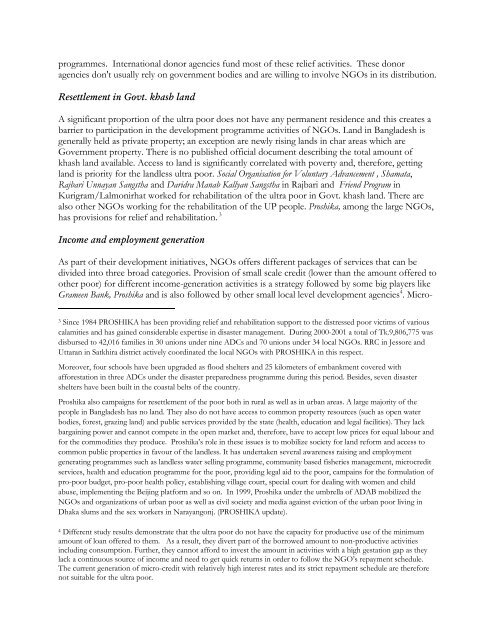
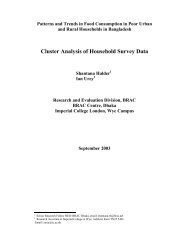
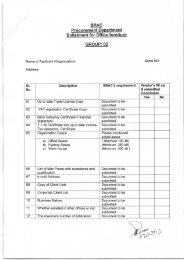
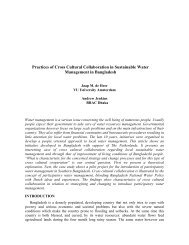
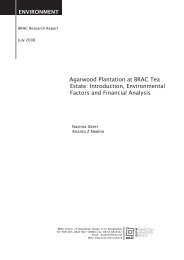
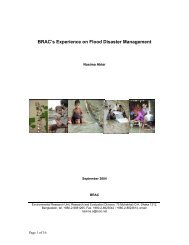
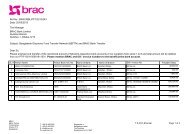
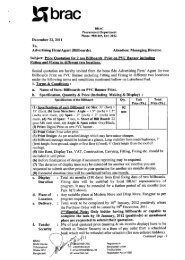
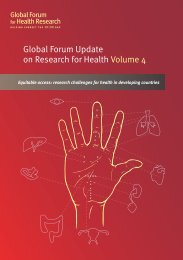
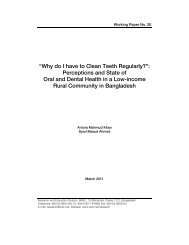
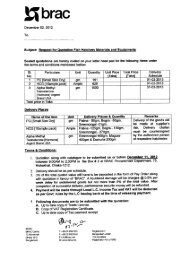

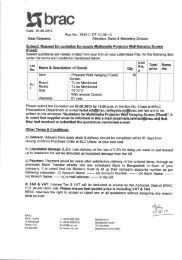
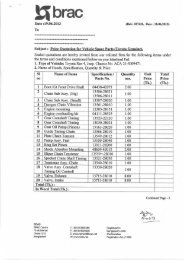
![[re-tender] RFQ for supply of Diesel Generator - Brac](https://img.yumpu.com/44421374/1/186x260/re-tender-rfq-for-supply-of-diesel-generator-brac.jpg?quality=85)
